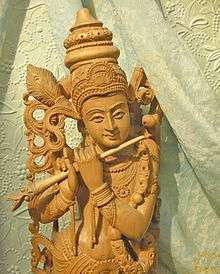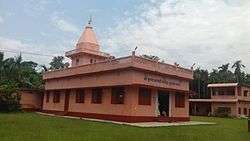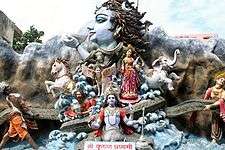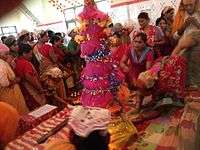Pranami
Pranami(Meaning: Those who bows on), also known as Dhami, is a Vaishnavism sub-tradition within Hinduism, focussed on god Krishna.[1][2][3] The tradition emerged in the 17th century in Western India, based on the teachings of Bhakti saints, Sri Devchandra Maharaj and his foremost disciple Sri Mehraj Thakur (also known as Mahamati Prannath or Prananath, which gives this tradition the name).[1]

The traditions grew after Mughal Empire declined, in the wake of Aurangzeb's religious persecution of non-Muslims, when Hindu rebellion led to new kingdoms. King Chhatrasal of one such kingdom of Bundelkhand patronized Prannath. The Pranami tradition welcomed brahman, kshatriya, vaishya, shudras to join the Supreme Truth Shri Krishna worship tradition. At conversion initiation, Prannath would invite the new members to dine together regardless of whether they came from any sanatan background. He would also explain the Pranami ideas by citing Hindu texts to make his teachings connect with the background of the converts.[3]


The religious center of the Pranami tradition has been in northeast Madhya Pradesh, in the town of Panna.[2] In the contemporary era, other major Pranami religious centers (gaddi) are in Jamnagar (Gujarat) and Phuguwa (south of Kathmandu, Nepal).[4]
The Pranami worship Shri Krishna as the Supreme Truth God, and its theology holds sagun Brahman (panentheistic) view of influenced by the Shuddhadvaita philosophy of Vallabhacharya.[1][4][5] Its Hindu includes just the texts. Its theology is contained in 14 religious texts attributed to Prannath, the Bhagavad Gita and the Bhagavata Purana.[1][6] While the Hindu scriptures Bhagavad Gita and the Bhagavata Purana are in Sanskrit, the 14 Prannath compositions contain 18,768 chaupai (verses), and is called Tartam sagar. It is, like in other Bhakti movement saint traditions, an eclectic mix of vernacular languages found in central, west and north India: Hindi, Gujarati, Sindhi and Sanskrit.[2][4] The Pranami devotees believe that Prannath taught with his text, the essence of all major religious texts of the world, including the Vedas, the Bhagawat Geeta and the Bible. The devotees believe in Hindu bhakti, but willingly accept teachings found in other sources and texts.[4]


The tradition is strictly vegetarian (ahimsa, non-violence to animals), non-caste tradition dedicated to Radha-Krishna.[1][4] Dedicated Pranami temples exist such as in Kathiawar and Gulf of Kutch region, but followers of Pranami traditions substitute it by praying and spiritual pursuits in any nearby convenient Hindu Krishna temples.[1][3] There are an estimated 5-10 million Pranamis found primarily throughout North India, particularly the states of Gujarat, Rajasthan, Punjab, Madhya Pradesh, Haryana, Uttar Pradesh, West Bengal (Darjeeling , Kalimpong and Sikkim), and Assam, as well as the eastern half of Nepal.[1]
Mahatma Gandhi's mother was a pious Pranami Hindu.[3] In this religion there is no such absolute statue of lord Prannath ji and byjurajji only their dress and crown is worshipped.
See also
- Advaita Vedanta
- Dvaita Vedanta
- Hare Krishna
- Pranami Sampraday
- Rama
- Vishishtadvaita Vedanta
References
- Toffin, Gerard (2011). The Politics of Belonging in the Himalayas: Local Attachments and Boundary Dynamics. SAGE Publishers. pp. 144–152. ISBN 978-8132105244.
- Shiri Ram Bakshi; S.R. Bakshi And O.P. Ralhan (2008). Madhya Pradesh Through the Ages. Sarup & Sons. pp. 205–206. ISBN 978-81-7625-806-7.
- Arvind Sharma (2013). Gandhi: A Spiritual Biography. Yale University Press. pp. 10–12. ISBN 978-0-300-18738-0.
- Gerard Toffin (2012). John Zavos; et al. (eds.). Public Hinduisms. SAGE Publications. pp. 249–254. ISBN 978-81-321-1696-7.
- "12 Commandments for a Pranami". Shri Krishna Pranami Sampraday.
- "Tartam Sagar". Shri Krishna Pranami Sampraday. Retrieved 28 September 2015.
Further reading
- Mukharya, P.S. (2003). Mahamati Prannath and the Synthesis of All Religions. Jamnagar: Shri 5 Navtanpuri Dham. ISBN 8186228535
